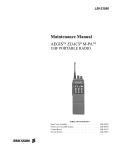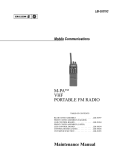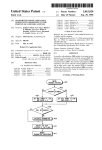Download Ericsson MTL-SX User's Manual
Transcript
LBI-38432A Mobile Communications MTL-SX 146 - 174 MHz PORTABLE TWO-WAY FM RADIO TABLE OF CONTENTS REAR COVER ASSEMBLY . . . . . . . . . . . . . . . . . LBI-38597 FRONT COVER ASSEMBLY (EARLIER) AND CONTROL BOARD . . . . . . . . . . . . . . . . . . . . . . LBI-38514 FRONT COVER ASSEMBLY (LATER) LESS CONTROL BOARD . . . . . . . . . . . . . . . . . . . . . . LBI-38834 SERVICE SECTION . . . . . . . . . . . . . . . . . . . . . . LBI-38515 Maintenance Manual LBI-38432 TABLE OF CONTENTS Page SPECIFICATIONS ............................................................................................................................... 3 OPTIONS AND ACCESSORIES ........................................................................................................ 4 INTRODUCTION ................................................................................................................................ FEATURES .................................................................................................................................... 5 5 DESCRIPTION..................................................................................................................................... REAR COVER ASSEMBLY........................................................................................................ FRONT COVER ASSEMBLY ..................................................................................................... ANTENNAS .................................................................................................................................. BATTERY PACKS ........................................................................................................................ UNIVERSAL DEVICE CONNECTOR....................................................................................... 6 6 6 6 6 7 PROGRAMMING ................................................................................................................................ FEATURES PROGRAMMABLE ON A PER CHANNEL BASIS............................................ FEATURES PROGRAMMABLE ON AN OVERALL RADIO BASIS ................................... 8 9 9 OPERATOR MANUAL ...................................................................................................................... 9 OPERATING TIPS ............................................................................................................................... 9 INTRINSICALLY SAFE USAGE....................................................................................................... BATTERY PACKS ........................................................................................................................ ACCESSORIES............................................................................................................................. 9 9 10 MAINTENANCE ................................................................................................................................. PREVENTIVE MAINTENANCE................................................................................................ 10 10 ILLUSTRATIONS Figure 1 - MTL-SX Portable Radio.............................................................................................. Figure 2 - UDC Pin-Out................................................................................................................ Figure 3 - Front Panel Parts .......................................................................................................... Figure 4 - Rear Cover Assembly Block Diagram ........................................................................ Figure 5 - Front Cover Assembly Block Diagram....................................................................... Table 1 - UDC Pin Functions...................................................................................................... 7 8 11 12 13 8 NOTE The software contained in this device is copyrighted by Ericsson GE Mobile Communications, Inc. Unpublished rights are reserved under the copyright laws of the United States. Copyright© June 1990, Ericsson GE Mobile Communications Inc. 2 LBI-38432 SPECIFICATIONS* GENERAL Frequency Ranges 146 - 162 MHz 157 - 174 MHz FCC Type Acceptance Number AXATR-182-B5 (146 - 162 MHz) AXATR-182-C5 (157 - 174 MHz) DOC Number TR-182-D2 Channel Capacity 16 Frequency Stability 5.0 ppm Channel Spacing 30 kHz Operating Temperature Range -30°C to +60°C Maximum Relative Humidity 90% at 55°C Battery Voltage 7.5 Vdc (nominal) Dimensions (H x W x D) less battery, knobs and antenna with Extra High Cap. Battery 140 x 69 x 38 mm (5.52 x 2.72 x 1.50 ") 232 x 69 x 40 mm (9.15 x 2.72 x 1.58 ") Weight less battery and antenna with Extra High Cap. Battery 540 grams (19 ounces) 907 grams (32 ounces) TRANSMITTER Rated RF Power Output 6.0 Watts High / Low RF Power Output 6.0 Watts / 1 Watt (programmable on a per channel basis) Maximum FM Deviation ±5 kHz FM Hum and Noise -45 dB (companion receiver) Spurious and Harmonic Emissions -75 dBc Audio Response +1 to -3 dB (6 dB/octave pre-emphasis from 300 Hz to 3 kHz) Audio Distortion less than 3% (at 1000 Hz tone, ±3 kHz deviation) RECEIVER Sensitivity (12 dB SINAD) -116 dBm (0.35 µV) Adjacent Channel Selectivity -80 dB Critical Squelch 10 dB SINAD Modulation Acceptance ±7 kHz Intermodulation -78 dB Spurious and Image Rejection -80 dB Audio Output 500 mW (24-ohm load impedance) Audio Response +2 to -8 dB (6 dB/octave de-emphasis from 300 Hz to 3 kHz) Audio Distortion less than 5% (at 500 mW) * These specifications are intended primarily for the use of the serviceman. See the appropriate Specifications Sheet for the complete specifications. 3 LBI-38432 OPTIONS AND ACCESSORIES Radios, Antennas, Batteries 146-162 157-174 440-470 MHz MHz MHz HELICAL HELICAL HELICAL Carrying Accessories ANTENNA PANC1C ANTENNA PANC1D ANTENNA PANC1F BELT CLIP PAHC1C Swivel Mount Plate 5203 CARRYING CASE WITH BELT LOOP PAHC1E PAHC1F WITH SWIVEL MT PAHC1G PAHC1H SHOULDER STRAP PAHC1K Audio Accessories HEADSET/MIC PAAB1A INTERFACE CONNECTOR (Provided with PAAB1A) EXTRA HIGH CAP. BATTERY PAPA1F (INTRINSICALLY SAFE) EXTRA HIGH CAP. BATTERY PAPA1E SPKR/MIC PAAE1A GE-STAR LANYARD PAAC1B HIGH CAPACITY BATTERY PAPA1G (INTRINSICALLY SAFE) HIGH CAPACITY BATTERY PAPA1H Chargers MULTI-CHARGER H2A2L2A 120 VAC 14 HR H2A2J1A 120 VAC 1 HR H2A2M2A 240 VAC 14 HR H2A2N1A 240 VAC 1 HR UNIVERSAL MULTI-CHARGER CH6RA1 120 VAC 1HR CH6SA1 120 VAC 14HR CH6RA2 230 VAC 1HR CH6SA2 230 VAC 14HR 4 UNIVERSAL DESK CHARGER CH1RA1 120 VAC 1 HR CH1SA1 120 VAC 14 HR CH1RA2 230 VAC 1 HR CH1SA2 230 VAC 14 HR COMPACT CHARGER H2A5C2A - Vehicular Charger H2A6L2A - Desk Charger VEHICULAR CHARGER H2V01 - Vehicular Charger H2V02 - Vehicular Chgr/Rptr Control LBI-38432 standard EIA frequencies, can be programmed for encoded/decoded operation. INTRODUCTION The Ericsson GE MTL-SX radio is a high-quality microprocessor-controlled synthesized portable FM radio. All transmitter and receiver functions are controlled by the microprocessor-based circuitry. The MTL-SX radio’s sturdy die-cast aluminum case has rotary volume and channel controls on its top panel and three (3) recessed push-buttons which provide scan control on its front panel. A indicator light on the front panel lights when the radio is transmitting and flashes when and the radio is scanning. A recessed emergency button is located on the top of the radio. All personality features are programmable with the PC programming software. • • • • FEATURES • • • • • • • 16-Channel Capability - The preprogrammed channels are selected with the top mounted rotary Control Knob. • Scan Capability With User Selectable Scan List - Using two (2) of the buttons on the front panel, the operator can add and delete any the programmed channels to the scan list. Priority-one and prioritytwo scan channels can also be selected. A thrid button on this panel is used to toggle scan operation on and off. • Volume Control Knob - This rotatable control provides quick and easy adjustments to the volume level. Minimum volume levels can be programmed into the unit to prevent missed calls due to a low volume setting. Monitor Button - This side-mounted button is used to disabled squelch and if programmed for the selected channel, it is used to toggle CG and/or T99 operation on and off. • • • Emergency Channel Feature - An emergency channel can be programmed into the radio for GESTAR emergency signalling. GE-STAR emergency signalling is activated by the recessed Emegency Button on the top panel of the radio. GE-STAR can also be activated by a lanyard connected to the UDC (Universal Device Connector). GE-STAR Compatibility - The radio can be programmed to transmit GE-STAR ID at PTT key, at PTT unkey, or both. 16,384 individual ID codes are available. • Programmable Multi-Tone Channel Guard (CTCSS) - Channel Guard tone frequencies within the range of 67 Hz to 210.7 Hz, including all of the • Programmable Multi-Code Digital Channel Guard - Similar capability as with tone Channel Guard is provided. Two-Tone Sequential (T99) Decode - Selective calling decode is enabled or disabled on each individual channel. Channel Busy Lockout - Personality information includes transmit disable capability on a channel where carrier activity is present. This feature is selectable on a per channel basis. Programmable Carrier Control Timer - A programmable transmit timer will automatically disable the transmitter and provide an alerting tone after time-out. This feature prevents radio damage and unnecessary channel traffic in the event of a "stuck" mic. The CCT is reset on every PTT. Programmable Transmit Power Level - Transmitter power level is PC programmable into the radio (high or low) on a per channel basis. Squelch Tail Elimination - Squelch and audio circuits are designed so that annoying squelch pops which may occur at the end of received messages are minimized. This feature is compatible with existing STE systems. Alert Tones - Alert tones prompt the operator of various radio conditions such as channel access, CCT time-out or a low battery. Programmable Through The Universal Device Connector (UDC) - The entire operation of the radio can be field customized by programming the unit using an IBM PC or compatible computer. The programmed personality is stored in non-volatile memory within the radio. Simple Remote Control Capability - External accessories can be connected to the UDC such as a headset, a speaker-mic or a lanyard. Connection of the speaker-mic allows the operator to remotely control PTT operation and audio level of the external speaker. An antenna jack is located on the UDC for the connection of a remote mounted antenna such as when the radio is used in a vehicular charger or repeater. Meets MIL-810C and D Specifications - The sturdy die-cast aluminum case is designed to seal out moisture, blowing rain and other harsh enviromental factors. Battery Packs - Several different battery pack sizes and capacities are available. Intrinsically safe battery packs are available for use in hazardous environments. 5 LBI-38432 • Available Options - These options include the antennas, audio accessories, batteries, carrying accessories, chargers, lanyards, and the vehicular charger/repeaters. DESCRIPTION The MTL-SX portable radio is consists of a two primary assemblies. The Front Cover Assembly contains all of the microprocessor circuitry, audio circuitry and the operating controls. The Rear Cover Assembly houses the RF circuitry which includes the transmitter, receiver and the frequency synthesizer. The assemblies are electrically interconnected by two single-in-line type connectors. When mated together, the assemblies form a weather resistant die-cast aluminum case that protects the radio’s circuitry from harsh outside environments. Power is provided by a battery pack that slides and locks on to the bottom of the radio. The radio’s on/off switch is located on the battery pack. The antenna screws on to the top of the unit. A side antenna connection is also provided at the UDC for an external antenna or for test purposes. This UDC antenna connection is also utilized for external antenna operation when the radio is locked in the vehicular charger or repeater. REAR COVER ASSEMBLY The Rear Cover Assembly houses the RF Board in the die-cast aluminum case. The complete assembly consists of the VHF RF Board, aluminum case, top antenna jack, side (UDC) antenna jack and various hardware. The RF Board’s circuitry includes the transmitter, receiver and the frequency synthesizer. This FM circuitry is under complete control of the microprocessor circuits. Controlling data sent to this assembly from the Control Board includes serial synthesizer data loading, transmitter/receiver enabling and a transmitter power level signal. The RF Board outputs the demodulated audio and a synthesizer lock status line to the Control Board. During transmitter operation, the RF power appears at the top antenna jack (or the UDC jack if the appropriate adapter plug is inserted). The Rear Cover Assembly maintenance manual contains a detailed circuit analysis, mechanical, outline and schematic diagrams for this assembly. FRONT COVER ASSEMBLY The Front Cover Assembly houses all of the operating controls and the digital control circuitry for the radio. The Control Board is installed in the Front Cover Assembly and 6 flex circuits include the Keypad, UDC and Speaker Flex circuits. The speaker, microphone and Battery Plate are also a part of this assembly. The complete assembly is housed in the die-cast aluminum front cover. The Control Board located in the Front Cover Assembly is the largest and most complex board in the Front Cover Assembly. It contains all microcomputer and audio circuitry which controls the radio. See the maintenance manuals specific to the Control Board or the Front Cover Assembly for service information on the related assembly. ANTENNAS Antennas are selected base on the operating frequency range of the radio. Antenna option PANC1C, part number 19B234804P2, is a 146 - 162 MHz (red bands) antenna and antenna option PANC1D, part number 19B234804P3, is a 157 - 174 MHz (orange bands) antenna. Both of these antennas are helically-designed and mount in the antenna jack on the top of the radio. An external antenna can be mounted to the unit via the UDC. When an antenna is connected to the UDC, the antenna on the top of the radio is disabled. BATTERY PACKS The battery pack connects to the bottom of the unit and delivers a nominal 7.5 Volts dc to the radio. A recessed on/off switch for the radio is located on the battery pack. An internal fuse located in the radio’s Battery Plate protects the radio and battery from excessive current draw. The battery packs are available in several different capacities and sizes. Radio contacts located on the top of the pack include switched power, ground, the speaker enabling contacts and a continuous power contact. In addition, four contacts are located on the rear of the battery pack. These four contacts provide connections to the slip-in type chargers or vehicular chargers/repeaters while the battery pack is still connected to the unit. The battery charging contacts are diode protected from external shorts. The chargers utilize an internal thermistor in the battery pack to sense temperature and automatically control charge rate of the battery. This allows for a maximum charge rate without overheating the battery pack. All battery packs can be charged in less than 1 1/2 hours with the rapid type chargers. Nominal full charge time in a standard charger is 14 hours. The Service Section contains a detailed outline and schematic diagram of a typical battery pack. Further service information for the battery packs is also presented in the Service Section. Chargers are available with nominal charge times of one hour (rapid) and fourteen hours (standard). Combinations include single (1) and multi (5 or 6) position standard and LBI-38432 SIDE VIEW FRONT VIEW Figure 1 - MTL-SX Portable Radio rapid charge units. In addition, the vehicular chargers/repeaters simultaneously charge the battery while the radio is operating. The battery packs should be fully charged in an appropriate charger before they are placed into service. This applies to new battery packs received from the factory and to battery packs that have been stored for long periods of time. A fully charged battery pack should have an open-terminal voltage greater than 7.5 Volts (typically 9.0 Vdc). The low battery alert tone will sound when the battery pack needs charging. UNIVERSAL DEVICE CONNECTOR The UDC is located on the side of radio just above the PTT and Monitor Buttons. Various equipment such as the audio accessories can be connected to the radio via the UDC. The programming equipment is also connected to it when the personality is programmed into the radio. The UDC furnishes an excellent first-check-point for initial bench checks without the need to disassemble the radio. Table 2 lists all pins and their appropriate function. When the radio is turned on it senses the resistance value between UDC pins 9 and 1 and switches the appropriate circuits to provide proper radioto-accessory operation. 7 LBI-38432 PROGRAMMING The radio’s personality is programmed using an IBM PC or compatible computer. A full-screen portable PC can be used for field programming. The Programming Manual and Software is TQ-3339 and TQ-4339. TQ-3339 is supplied with 5-1/4 inch floppy disks and TQ-4339 is supplied with 3-1/2 inch disks. This software uses a series of screens and windows to guide you through a programming session. See TQ-3339 or TQ-4339 for further programming details. PC Programming Adapter TQ-3310 and Programming Cable TQ-3311 will also be required. These items provide interface and connection between the PC and the radio when the personality is transferred from the PC into the radio. NOTE After programming or reprogramming the radio, disconnect the programming cable an turn the radio off and then back on. This action will take the radio out of programming mode and restore normal operation. Figure 2 - UDC Pin-Out Table 1 - UDC Pin Functions PIN 8 NAME INPUT OR OUTPUT ------ USE 1 GROUND 3 UDC RX AUDIO Output Test Point For Speaker Audio 4 SW BATT Output Switched Accessory Power 5 EXT PTT Input External Microphone PTT Input 6 TX DATA Input For Programming 7 RX DATA Output For Programming 8 SPARE 9 UDC VOLT 10 T/R Output Low = Transmit, High = Receive 11 UDC MUTE Output Low = Audio Muted 12 EXT MIC HI Input External Microphone Audio Input 13 EXT EMER Input Lanyard Connection 34 UDC DISCR Output ------ Case Ground Option/Accessory Sense Pin Test Point For RX Audio LBI-38432 FEATURES PROGRAMMABLE ON A PER CHANNEL BASIS • • • • • • • • • • • Transmit and Receive Frequencies Tone or Digital Channel Guard Encode/Decode Type 99 Tone Decode Enabled or Disabled Transmit Power Level High or Low Battery condition is another critical factor in the trouble free operation of a portable radio. Observe the procedures listed in the Service Section to insure the battery packs do not develop the "Memory Effect". Transmit STE On or Off Channel Busy Lockout Enabled or Disabled Carrier Control Timer Alert Tones On or Off Switch Crystal Frequency Enabled or Disabled GE-STAR Enabled or Disabled GE-STAR sent with Channel Guard FEATURES PROGRAMMABLE ON AN OVERALL RADIO BASIS • • • • • • In areas where transmission or reception is poor, some improvement may be obtained by insuring that the antenna is vertical. Moving a few yards in another direction or moving to a higher elevation may also improve communication. Vehicular operation can be aided with the use of an externally mounted antenna. Minimum Volume Level Power-Up Beep On or Off GE-STAR And GE-STAR Emergency Options Type 99 Tone Group Set Scan with Channel Guard Enabled or Disabled Priority-One Scan Channel is the Selected Channel, Fixed Channel or Keypad Entered Channel OPERATOR MANUAL Complete operating details for the MTL-SX radio are included in operator manual LBI-38431. OPERATING TIPS Always observe all of the Federal Communication Commission’s rules and regulations during any service or operating procedure. INTRINSICALLY SAFE USAGE Selected portable radios with appropriate factory installed F4 Options are certified as Intrinsically Safe by the Factory Mutual Research Corporation. Intrinsically Safe approval includes Class I, II, III, Division 1 hazardous locations in the presence of Groups C, D, E, F and G atmospheres. Non-Incendive approval includes Class I, Division 2 hazardous locations in the presence of Groups A, B, C and D atmospheres. Hazardous locations are defined in the National Electrical Code. Useful standards NFPA 437A and NFPA 437M for the classifications of hazardous areas can be ordered from the National Fire Protection Association, Batterymarch Park, Quincy, MA 02269. BATTERY PACKS Only battery packs identified with a green latch shall be used with a portable radio that is rated and labeled as Factory Mutual Intrinsically Safe. Use of non-specified battery packs voids Factory Mutual approval. The following battery pack options are approved for use in intrinsically safe radios: PAPA1F (19A704860P6) Rechargeable Battery Pack, Extra High Capacity (Tall Case) PAPA1G (19A704850P6) Rechargeable Battery Pack, High Capacity (Short Case) Antenna location and condition is important when using a VHF radio. Operating the radio in low areas of terrain, under power lines or bridges, inside of a vehicle or in a metal or steel framed building can severely reduce the range of the unit. Mountains and buildings can also reduce the range of the unit. 9 LBI-38432 ACCESSORIES MAINTENANCE The accessories that follow are approved for use with intrinsically safe radios. Use of accessories other than those listed voids Factory Mutual approval. The MTL-SX radio is a very reliable unit and will normally provide many years of trouble-free service. The recommended Preventive Maintenance procedures that follow should be preformed when a technician comes in contact with a unit. Component level troubleshooting information is contained in the Service Section. PAAB1A (19B801508P3) Headset/Microphone PAAC1A (19B801508P2) Earpiece Kit PAAC1B (19B801508P8) GE-STAR Lanyard PAAE1A (19B801508P1) Speaker/Microphone PAAE1B (19B801508P4) Speaker/Microphone with GE-STAR Lanyard PAAE1C (19B801508P6) Speaker/Microphone/Antenna Battery Packs PANC1C (19B234804P2) Antenna, 146 - 162 MHz, Helical Insure the battery packs are properly maintained. Do not over or under charge them on a regular basis. Verify the contacts are clean and free of corrosion. PANC1D (19B234804P3) Antenna, 157 - 174 MHz, Helical PAHC1C Belt Clip PAHC1D Swivel Mount with Belt Loop Since portable radio units are subject to shock and vibration, check for loose plugs, knobs, screws, etc. PAHC1E Case, Leather, with Belt Loop (Short Case) Transmitter Check PREVENTIVE MAINTENANCE Antenna The antenna and antenna contact should be kept clean and free from dirt or corrosion. If the antenna contact should become dirty or corroded, communication range could be reduced. Mechanical PAHC1F Case, Leather, with Belt Loop (Tall Case) PAHC1G Case, Leather, with Swivel Mount and Belt Loop (Short Case) PAHC1H Case, Leather, with Swivel Mount and Belt Loop (Tall Case) Receiver Check PAHC1K Shoulder Strap, Leather, with Mounting Plate Receiver sensitivity should be checked periodically as an indication of overall receiver operation. PAHC1N Holster, Plastic. Check transmit frequency and deviation. Normally these checks are made when the unit is first put into operation. They should be repeated after the first month of operation, then annually. Cleaning If the unit requires an external cleaning use mild soap and a damp cloth. Avoid abrasive cleaners or chemicals which may damage the plastic or rubber surfaces on the unit. 10 LBI-38432 (19D438678, Sh. 3, Rev. 8) Figure 3 - Front Panel Parts Printed in U.S.A. 11 LBI-38432 BLOCK DIAGRAM Figure 4 - Rear Cover Assembly Block Diagram 12 BLOCK DIAGRAM LBI-38432 Figure 5 - Front Cover Assembly Block Diagram 13

















